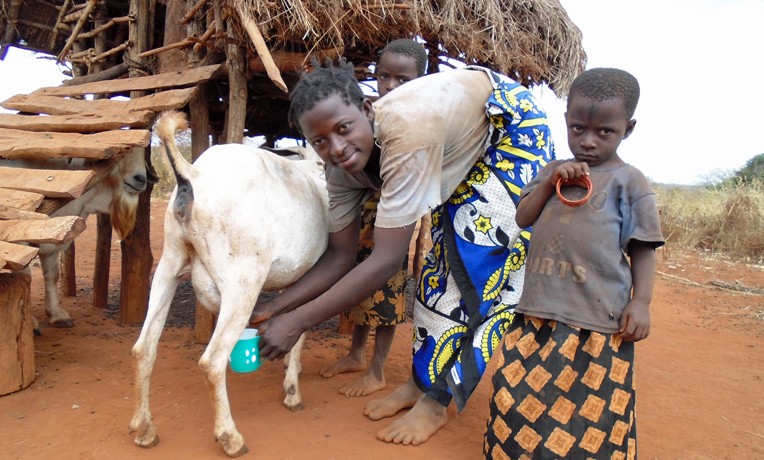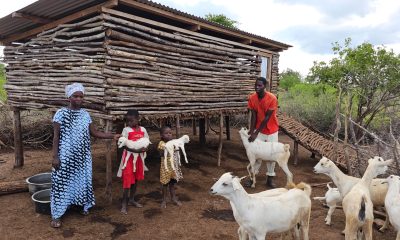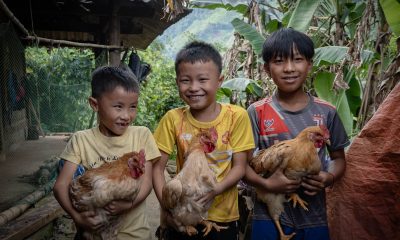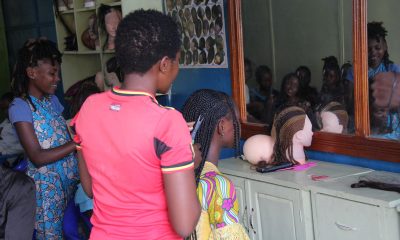Goat projects in rural Kenyan villages provide families with sources of income
In November 2014, I was invited to a celebration by a group of beneficiaries in Kabingu village, Kwale County, who had received goats from Samaritan’s Purse in 2012. At the onset of the project, 15 beneficiaries were selected to receive 55 total goats. Besides receiving training on the construction of goat shelters, the beneficiaries were also trained on management and disease control.
They also agreed that before they would sell any goat for an income, they would pay back every doe they received after the animals gave birth. By the end of the second year, the group had paid back 33 female offspring, sold 11 male offspring, and had 133 remaining goats. In total, the herd had increased to 177 goats in a timespan of two years.

Beneficiaries in Kabingu
The group has been spraying the goats against ticks and tsetse flies every two weeks without fail, dewormed them quarterly, and vaccinated them annually against diseases. As a result, the group had recorded only eight deaths, which was a remarkable improvement.
On the day of the celebration, a team from the Samaritan’s Purse livestock project drove to the Kabingu. We weaved through the dusty and rocky roads that aren’t frequented by vehicles apart from old trucks collecting and ferrying charcoal. One pastor said ours was the first vehicle to enter the village in more than 20 years. The area is forgotten, and the people are poor. They rely on selling firewood and charcoal to bigger cities like Mombasa, which is about 95 miles away.
We arrived late in the afternoon. The group members started with a word of prayer from the village pastor, in recognition that the assistance they received from Samaritan’s Purse is indeed a divine provision. Later they invited one beneficiary, a widow, to tell her story about how the livestock program had benefitted her. Chizi Ngome explained that before she joined the project, any death of a goat in the village was thought to be a result of witchcraft.
“We suspected other people for bewitching our goats,” she said. “What we did not know was that our goats died due to diseases which we knew little about. My family can now enjoy tea with milk from my goats. I do not have to drink strong tea [tea without milk] anymore. I am thankful for this project”.
The leader of the group then invited the village pastor to speak. In his speech, he thanked Samaritan’s Purse for bringing assistance to their village of Kabingu. He was grateful for the kind, considerate, and loving staff that served in the project.

The only school in Kabingu village
The pastor then made a strong appeal about the neighboring villages that were desolate, one of which is called Kidzaya. He stated that the village was neglected by other organizations and not many basic services were available there. The village is indeed poor with no health or education facilities. The only school in the area—built of mud and stick walls—can only accommodate pupils up to grade four.
“Witchcraft and traditional beliefs reign supreme in Kidzaya village,” the pastor said.
He said he had even adopted one young orphan girl who had been cursed with an evil spell. He had prayed for her healing and then took her to school. As I listened to the words of the pastor, I remembered Paul’s vision of the man in Macedonia, standing and begging him, ‘’Come over to Macedonia and help us’’ (Acts 16:9b, NKJV). At that point, I concluded in my mind that if we were able to continue our work in 2015, we would work to expand this program of the Lord in Kidzaya village.
It’s now 2015, and the Lord has given us another opportunity to serve the people of Kwale County. We have gone back to Kidzaya village to select 20 families that will receive goats during this program year. We will also be reaching out to three other villages as well. Pray that God will use the project to challenge strongly rooted cultural believes and practices that hinder the advancement of the Gospel and progress of people economically.








